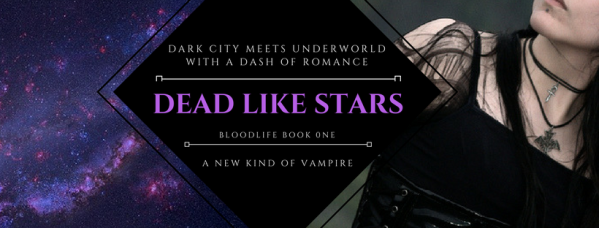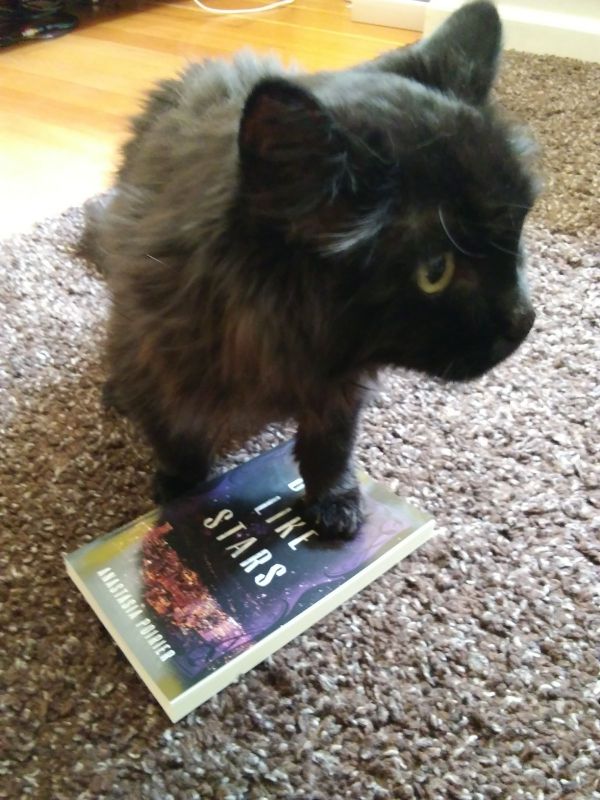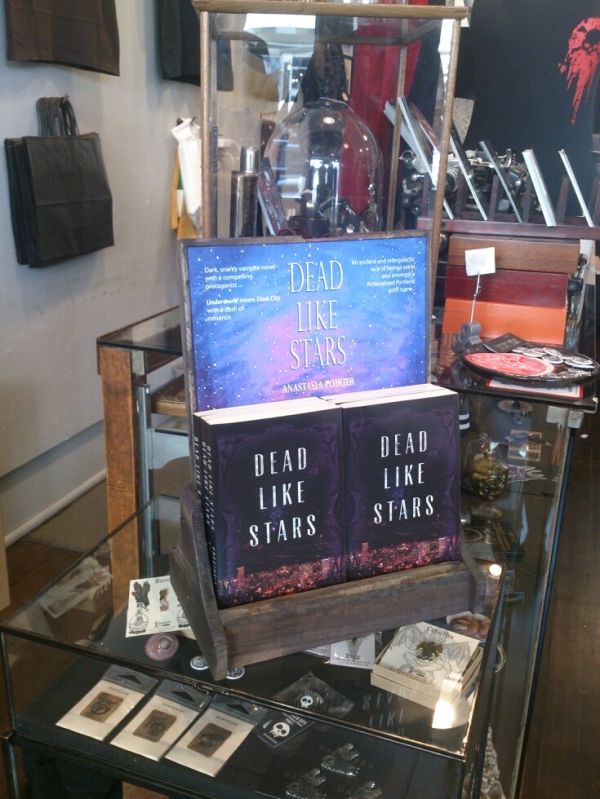There are several antagonists in Dead Like Stars, book one of my Bloodlife series, but my favorite, and most misunderstood of the lot, is Ecrin.
Inspired, in appearance, by Tilda Swinton’s character, Eve, in The Only Lovers Left Alive, thin and tall, with matted pale-blonde hair, Ecrin is both good and bad. She’s is a mystery, and she may not be who she’s believed to be.

Ecrin is a difficult character to write. For one, she’s not human–no big deal, few characters are in this series–but she’s also duplicitous. It’s quite possible that she’s playing both sides. It’s why her scenes are written in distant third person, rather than the first person found throughout the rest of the book. She is cold, calculating, and deceptive because she has to be. But underneath it all, she is driven by a noble cause. I can’t reveal her secrets today, but you’re sure to find out more in book two, Darkling Like Stars, which will be released later this year.
Please enjoy this excerpt from Dead Like Stars. Our first run-in with Ecrin. (Spoiler alert: violent-ish content).
A black cargo van rolls to a stop outside a steel and brick warehouse, and a motion-activated floodlight blinks on. The harsh light barely penetrates the van’s darkly tinted windows, exposing only shadows of the two inside. The passenger door opens and a woman steps out. She jerks a heavy robe over her high-collared, white uniform and tucks her matted blonde hair into the hood as she makes her way to the front of the van. She pauses before the warehouse’s steel double doors, and a look of what might be annoyance flashes across her face, her violet eyes narrowing for an instant before she turns to the sound of the driver’s door closing.
The driver is masculine with a smooth, bare head, but he looks like something pretending to be a man—it’s his eyes, dark, possibly black like those of a demon in a horror movie. Like his partner, his skin is so pale, it’s nearly indistinguishable from the luminescent whiteness of his uniform over which he straightens his own grey robe, then flips the hood up before stopping at the woman’s side. He is taller by a foot and it takes her a moment to find his face, just a fraction of a second, as if she expects someone closer to her own height. Their eyes meet and the light finds its way beneath his hood. His eyes aren’t black but violet, the same color as the woman’s, yet different: apart from the color, her eyes pass for human, but his are solid, insectile, pupilless. He glances down at her, the skin between his non-existent eyebrows pinches together, and they speak in an unknown, harsh language—their voices soft and feminine, eerily similar—then he slips through the double doors into the warehouse while she circles to the rear of the van and opens the doors.
The hold of the van is bare metal; the floor has dark patches of rust or maybe dried blood. At one time there may have been carpet and seats but they’re missing now. A heavy wire mesh separates the back from the cab.
Hardly two minutes pass before the warehouse doors swing open. The tall man in grey steps out, and a procession of people follow, single file, their faces blank, necks and shirts smeared with blood. They cross the few feet of asphalt to the rear of the van, where the robed woman shoves them into the van.
A brunette woman of perhaps thirty stumbles; the robed figure catches her by the hair and yanks her upright with incredible force, then pushes her into the hold. The brunette’s face remains blank—even as she scuffs her knees on the bare metal—and the others already in the van take no notice; no one offers help, and she doesn’t wait; she picks herself up and shuffles to the back, pressing in against the others to make room.
The robed woman hesitates, her fist bunched in a man’s sweatshirt, squints at a streak of blood on the back of her hand. She pushes the man in, casually wiping her hand clean on the front of the next person’s shirt, a slight grimace twisting her pale lips.
The van fills rapidly, even though the vacant people pack in close, and still more people file out of the warehouse. The robed figures don’t seem concerned. Their calm demeanor suggests they’ve done this before, many times.
Want to meet more villains from other awesome Urban Fantasy writers? The Villain Crawl continues…
Author Tiffany Apan on My Haven on this Desolate Terrain A 19th-century Romanian aristocrat who takes pleasure in seeing those beneath him suffer…
Author Susanne Leist on Susanne Leist A human vampire steals Linda’s heart. He taunts and teases her, but will she succumb to his desires?
Author K. Matt on Welcome to Hell BentThree brief interviews with three different villains: a genetically-altered serial killer, a centuries-old, supreme luddite of a mage, and a cyborg/arms dealer.
Author Debbie Manber Kupfer on Paws 4 Thought Alistair is a werewolf seeking justice. When his mentor sends him on his first mission he knows who the victim must be.
Author Maaja Wentz on Maaja Wentz Necromancers are the unsung heroes of the undead world in FEEDING FRENZY. Find out why you should worship the fungus among us when the Entity rises!
Author Rebekah Jonesy on Heart Strong Leucosia, siren daughter of Achelous, is sick. And very hungry. With her health deteriorating she is forced to subsist on the softest human flesh, but she has a plan.
Author Aziza Sphinx from on Aziza Sphinx Into the Dark My name is Emiliano Ortega. I didn’t ask to be a paw in Truth’s game yet here I am playing the Reaper when all I want to do is sleep.
Want more about what I’m up to? Join for my mailing list for updates.










